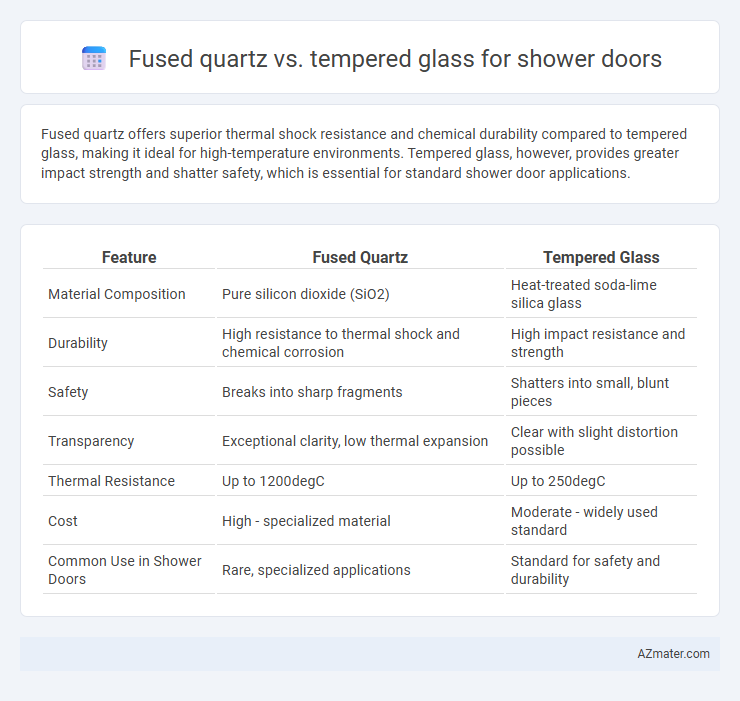Fused quartz offers superior thermal shock resistance and chemical durability compared to tempered glass, making it ideal for high-temperature environments. Tempered glass, however, provides greater impact strength and shatter safety, which is essential for standard shower door applications.
Table of Comparison
| Feature | Fused Quartz | Tempered Glass |
|---|---|---|
| Material Composition | Pure silicon dioxide (SiO2) | Heat-treated soda-lime silica glass |
| Durability | High resistance to thermal shock and chemical corrosion | High impact resistance and strength |
| Safety | Breaks into sharp fragments | Shatters into small, blunt pieces |
| Transparency | Exceptional clarity, low thermal expansion | Clear with slight distortion possible |
| Thermal Resistance | Up to 1200degC | Up to 250degC |
| Cost | High - specialized material | Moderate - widely used standard |
| Common Use in Shower Doors | Rare, specialized applications | Standard for safety and durability |
Introduction to Shower Door Materials
Fused quartz offers exceptional thermal stability and chemical resistance, making it a durable choice for shower doors exposed to fluctuating temperatures and harsh cleaning agents. Tempered glass, commonly used in shower enclosures, provides high strength and safety by shattering into small, less harmful pieces upon impact. Both materials balance aesthetics and functionality, but fused quartz stands out for superior heat resistance, while tempered glass is more cost-effective and widely available.
What is Fused Quartz?
Fused quartz is a high-purity glass made by melting natural quartz sand at extremely high temperatures, resulting in superior thermal stability and resistance to chemical corrosion compared to tempered glass. Unlike tempered glass, which is heat-treated to increase strength but can still contain impurities and stress points, fused quartz offers exceptional clarity and durability, making it ideal for shower doors requiring long-lasting performance. Its ability to withstand rapid temperature changes without cracking provides a distinct advantage in bathroom environments where steam and temperature fluctuations are common.
What is Tempered Glass?
Tempered glass, also known as toughened glass, is a type of safety glass processed by controlled thermal or chemical treatments to increase its strength compared to normal glass. It is designed to shatter into small, blunt pieces instead of sharp shards, reducing injury risk in shower door applications. Unlike fused quartz, tempered glass offers enhanced impact resistance and durability, making it a popular choice for bathroom environments requiring safety and reliability.
Strength and Durability Comparison
Fused quartz offers exceptional strength and superior thermal stability compared to tempered glass, making it highly resistant to cracking under extreme temperature changes in shower doors. Tempered glass, while strong and impact-resistant due to its heat treatment process, is more prone to shattering under concentrated stress or sudden temperature fluctuations. The enhanced durability of fused quartz ensures longer lifespan and safer performance in showers exposed to frequent hot water and temperature variations.
Safety Features and Impact Resistance
Fused quartz offers superior thermal stability and exceptional impact resistance compared to tempered glass, reducing the risk of shattering under sudden temperature changes. Tempered glass is designed to break into small, blunt pieces, enhancing user safety by minimizing injury hazards in case of breakage. While fused quartz provides higher durability and resistance to chemical corrosion, tempered glass remains a cost-effective option with adequate strength and improved safety features for shower door applications.
Aesthetic Appeal and Design Flexibility
Fused quartz offers exceptional clarity and a smooth, consistent surface that enhances the minimalist aesthetic of modern shower doors, providing a premium, high-end look. Tempered glass, widely used for its safety and durability, allows for versatile design options including frosted, textured, or tinted finishes, catering to a variety of style preferences and privacy needs. Both materials support custom shapes and sizes, but fused quartz is prized for its superior optical properties, making it ideal for sleek, contemporary bathroom designs.
Maintenance and Cleaning Requirements
Fused quartz offers exceptional resistance to scratches and chemical damage, resulting in easier maintenance and less frequent cleaning compared to tempered glass. Tempered glass, while durable, is more prone to water spots, soap scum, and mineral buildup, necessitating regular cleaning with mild detergents and non-abrasive tools to maintain clarity. Both materials benefit from routine wiping and the use of squeegees to reduce residue and prolong the door's pristine appearance.
Cost Analysis: Fused Quartz vs Tempered Glass
The cost of fused quartz shower doors is significantly higher than tempered glass due to its superior thermal resistance and durability, with prices typically starting at $150 per square foot compared to $30-$50 per square foot for tempered glass. Installation expenses for fused quartz can also be higher because of its weight and the need for specialized handling and cutting equipment. Tempered glass remains the more budget-friendly option for most shower door projects, offering a balance of strength, safety, and affordability.
Environmental Impact and Sustainability
Fused quartz offers superior environmental benefits compared to tempered glass for shower doors due to its high durability and resistance to thermal shock, leading to a longer lifespan and reduced material waste. Tempered glass production typically involves higher energy consumption and emits more greenhouse gases during the tempering process. Choosing fused quartz can contribute to sustainability efforts by minimizing resource extraction and lowering the carbon footprint associated with manufacturing and replacement.
Which Material is Best for Your Shower Door?
Fused quartz offers exceptional thermal resistance and durability, making it highly resistant to cracking or warping under heat and steam conditions in a shower. Tempered glass provides superior impact resistance and safety by shattering into small, less harmful pieces if broken, making it popular for shower doors. For long-term performance and safety, tempered glass is often considered the best choice due to its balance of strength and cost-effectiveness, while fused quartz is preferred for premium installations requiring high thermal stability.

Infographic: Fused quartz vs Tempered glass for Shower door
 azmater.com
azmater.com